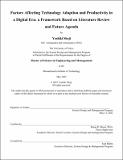Factors Affecting Technology Adoption and Productivity in a Digital Era: a Framework Based on Literature Review and Future Agenda
Author(s)
Shoji, Yoshiki
DownloadThesis PDF (5.443Mb)
Advisor
Moser, Bryan R.
Terms of use
Metadata
Show full item recordAbstract
Japan's productivity growth has slowed since the 2000s, and in 2020 it ranked last among the G7 countries. Assuming that the reason for this is the rapid pace of technological change, this study uses a literature review and data analysis to identify the factors that contribute to technology adoption, which are often described as cultural differences. By summarizing supporting forces and restraining forces within a company and visualizing the process of technology adoption, a framework of technology adoption is constructed. There, the focus is on the aspect of acquiring human resources. As a result of the data analysis based on data from Orbis, LinkedIn, indeed, Zephyr, D&B Hoovers, and Ci Technology Data Set covering large manufacturing companies in the U.S., it is found that the more employees feel they are learning something in their work, the higher their adoption of technology will be. Surprisingly, however, no relationship is found between technology adoption and productivity, which can come down to a new hypothesis that technology adoption is a necessary but not sufficient condition for productivity growth. Based on the various data limitations identified in the process of conducting the analysis, the report summarizes a future research agenda to overcome these limitations.
Date issued
2022-05Department
System Design and Management Program.Publisher
Massachusetts Institute of Technology